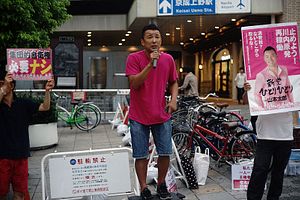While populism is rising across the world, Japan has so far been immune to it. There is no Japanese equivalent to Marine Le Pen, Donald Trump, or Rodrigo Duterte. This, however, seems to be changing after the upper house election on July 21, in which a new left-wing, anti-establishment party made big strides. What is happening to Japan’s “firewall against populism”?
Scholars attribute the firewall to the lack of ethnic or economic cleavages that populist leaders can exploit to build an anti-immigration or class-based platform. Despite measures to increase foreign workers, Japan remains a homogeneous nation, with resident foreigners only accounting for 1.76 percent of its population. Japanese society is also egalitarian, without high income inequality as in the United States and elsewhere. And the country has seen a steady economic recovery since Prime Minister Shinzo Abe took office in 2012, with an unemployment rate at historic low 2.3 percent.
Against this backdrop, the Liberal Democratic Party (LDP) and its coalition partners won almost a supermajority in the Upper House by touting the success of Abe’s economic policies, known as Abenomics.
But it is too early for Abe to celebrate victory because the election brought a worrying sign of rising populism in Japan. Reiwa Shinsengumi, an anti-establishment party organized only three months before the election by actor-turned-politician Taro Yamamoto, made a big splash. Running an internet-based, grassroots campaign, the party mobilized 3,500 volunteers, raised $4 million in donations, and won 4.6 percent of the total votes and two seats in the upper house. Yamamoto himself did not win a seat but still gained nearly 1 million votes, the largest number of votes for an unsuccessful candidate under the current electoral rules. He has pledged to run again and to list about 100 candidates in the next lower house election.
What is notable about Reiwa Shinsengumi is not just its electoral success without a traditional party organization, but also its embrace of left-wing populism, which earned Yamamoto the nickname of “Japan’s Bernie Sanders.” He ran on an anti-capitalist theme of creating “a society that does not judge people by their productivity” and blaming the existing system for ignoring the poor and the vulnerable. Alongside vowing to tax the rich, abolish the sales tax, raise the minimum wage to $14 per hour, and forgive student debt, he handpicked two people with heavy disabilities as the party’s top candidates. Both candidates won seats through proportional representation, making a symbolic point that the Diet — and society at large — must accommodate those with disabilities.
Certainly, the electoral hurdle remains high for the new populist party. Winner-take-all, single-member districts favor major parties like the LDP, meaning that minor parties like Reiwa Shinsengumi can only win seats through proportional representation. To win these districts, the new party must coordinate with other opposition parties and pick one candidate to face the LDP.
However, the electoral success of Reiwa Shinsengumi should give a humble pause for both the LDP and major opposition parties. First, it reflects the decline of Japanese party politics. One poll shows a sweeping 58.3 percent of the Japanese have no preferred political party. Nearly 10 percent of the independents voted for Reiwa Shinsengumi, compared to 25 percent for the LDP. Given such frustration with the establishment, the voter turnout for the election was 48.8 percent, the second-worst record in postwar history. In fact, despite winning a majority, the LDP only gained 20 million votes, about 19 percent of the total electorates. These are troubling numbers for the LDP’s claim to a popular mandate.
Second, the Reiwa Shinsengumi phenomenon reflects a widening socioeconomic disparity in Japan. While Abenomics has delivered a rising stock market and a record low unemployment rate, it has not resolved economic anxiety resulting from the rise of temporary employment, no progress on pension reforms, and the declining population. The poverty rate in Japan is nearly 16 percent, the second-worst among the G7 countries, and 57.7 percent of the Japanese say they face economic hardships. Reiwa Shinsengumi’s populist agenda appealed to these people.
Third, the fact that other major opposition parties missed the opportunity to attract these frustrated voters shows that Japan has no formidable opposition to challenge the LDP. Many opposition parties indeed pushed policies similar to Reiwa Shinsengumi’s, including raising the minimum wage and forgiving student debt. However, they could not craft a uniform message that can mobilize their supporters and the independents. Reiwa Shinsengumi filled the void.
Taken together, the field seems open for populist parties like Reiwa Shinsengumi to flourish in the coming years. While it remains to be seen whether such parties can tear down Japan’s firewall against populism, the LDP and the opposition should learn from Reiwa Shinsengumi’s success and work to restore public trust in party politics.
Daisuke Minami is an expert on East Asian security, U.S.-Japan relations, and Japanese politics. He holds a Ph.D. in political science from The George Washington University and was a research fellow at Waseda University, Tokyo. He has written for the European Journal of International Relations, GWU’s Elliott School of International Affairs, and various think tanks.

































